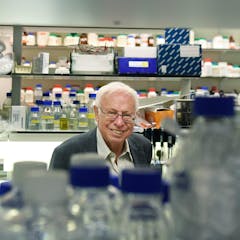
Articles on DNA
Displaying 341 - 360 of 470 articles

The most important lesson? Always read the small print.

When men deny the paternity of children, many South African women feel like they have no recourse. Making DNA tests affordable and accessible could change this.

New research suggests how we could prevent genetically modified organisms from surviving - and potentially spreading - in the wild.

The International Summit on Human Gene Editing drew a distinction between editing an individual’s body cells and editing germline cells that would pass changes to future generations. Does that make sense?

Biology is out of our control but can influence our behaviour. But should people be given shorter sentences because of their genes?

Should the gathering of experts from around the world that’s considering the scientific, ethical, and governance issues linked to research into gene editing ring alarm bells?

While gene editing offers the exciting potential for disease therapies, using it on human embryos opens up a can of worms.

How ‘junk’ DNA threw a spanner in the works.

Despite science refuting the existence of different human races, people have used “race” throughout history to divide and denigrate certain people while promoting their claims of superiority.

How many times do people make the comment about which parent a child takes after. So what does genetics say?

Forget the pith helmet and butterfly net. Discovering biodiversity now is much more about metagenomics and the 0’s and 1’s of digital databases.

The how and the when of dog domestication are fairly settled. As for the where: now DNA says Fido traces his roots back to wolves in Central Asia that lingered around people’s camps millennia ago.

The new ‘science play’ Photograph 51 is hot on the heels of a host of others, including Stoppard’s The Hard Problem. Why are audiences attracted to these right now?

A new study has looked at the ‘father effect’ in epigenetics.

The discovery made by three Nobel Prize winning chemists is one of biology’s most important safeguards against imperfection in DNA.

Cells must repair the thousands of bits of DNA damage they incur every day. These cellular mechanisms fend off cancerous tumors, and cancer researchers are working to harness their power.

The recipients of this year’s Nobel Prize for Chemistry showed that DNA is far from static. Rather, it is bombarded by damaging forces, but our bodies know how to repair these precious strands.

The 1000 Genome Project has revealed the genetic variations that exist among people around the world, and discovered that some people are missing many genes.

There’s an issue of impunity around sexual violence in conflict zones. Here’s how science could help us solve it.

The origin of life is still an unsolved riddle. How were life’s building blocks first assembled?
